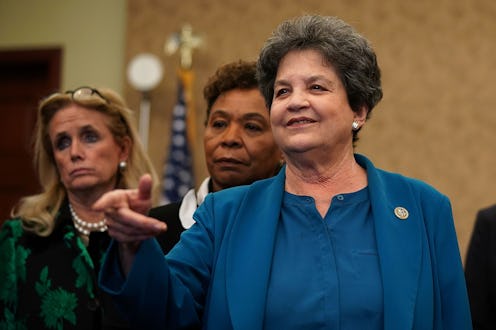News
Democrats Are Inviting Sexual Assault Victims As Their Guests For Trump's SOTU

Donald Trump’s first State of the Union address is quickly approaching, and some House Democrats are planning to invite survivors of sexual assault to attend the event. In the wake of the Harvey Weinstein scandal and the #MeToo movement, an aide to Florida Rep. Lois Frankel told NBC that Democrats want to highlight sexual harassment and misconduct.
Frankel, who is a leader of the Democratic Women’s Working Group (DWWG) in the House, has been outspoken on the issue of sexual misconduct. She is one of the Democrats reportedly leading the charge to invite sexual assault survivors to the address. Bustle has reached out to her office for comment. Just last month, 56 members of her group requested a congressional investigation into the misconduct allegations made against Trump — of which there are almost 20 and which he denies, according to New York Magazine.
Inviting sexual assault survivors to the event is not the only form of protest we can expect from Democrats during Trump’s address. Led by California Rep. Jackie Speier, female Democratic lawmakers are also planning to follow the example of women at the recent Golden Globes by wearing black to the SOTU address.
“This is a culture change that is sweeping the country and Congress is embracing it,” Speier said in a written statement. Speier is another leader of the DWWG, alongside Frankel.
Multiple Democrats told NBC that they had not discussed inviting the women who have made allegations against Trump; instead, they said, they would be sending invitations to other survivors of sexual harassment and assault. One anonymous lawmaker reportedly told NBC that if Democrats were to extend an invitation to the women who accused Trump of assault, it could be perceived as an act of retaliation against the president.
During the presidential election, just before a debate against Democratic candidate Hillary Clinton, Trump held a press conference for women who had accused former President Bill Clinton of sexual misconduct. The unnamed lawmaker reportedly told NBC that Democrats would be “no better” than Republicans if they pulled a similar move.
Despite receiving such pushback, the DWWG is encouraging all lawmakers, regardless of political party or gender, to wear black to the SOTU address. One Democratic lawmaker, however, said in a statement that he would be boycotting the address altogether.
“Rather than listening to yet another destructive and divisive speech by Trump, I will not attend this year’s annual address to Congress,” Oregon Rep. Earl Blumenauer said in a statement. “Instead, like I did during Trump’s Inauguration, I will be working here at home listening to Oregonians about what they think about the State of the Union."
As prominent figures in multiple industries face consequences for alleged sexual misconduct, Frankel has called into the question the fact that Trump has yet to do so. He has denied all of the sexual assault allegations made against him, dismissing them as “fake news,” but Frankel nonetheless considered holding mock hearings with women who had made accusations against Trump. House Minority Leader Nancy Pelosi convinced Frankel not to go through with this proposal, arguing that such hearings would make it difficult to work on bipartisan legislation combating sexual violence.
"The consensus of the Democratic Caucus, and Rep. Frankel's strong belief as well, is to focus these hearings on women across all industries — from workers on factory floors to hotel rooms to restaurant kitchens," Frankel’s aide told NBC. "Rep. Frankel is hopeful they will be productive and is working to make them a bipartisan effort."
Trump’s SOTU address is slated to take place on Jan. 30. If he follows tradition, he will appear before a joint session of the Senate and the House of Representatives to address his legislative agenda, deliver an economic report, and outline national priorities for the upcoming year.